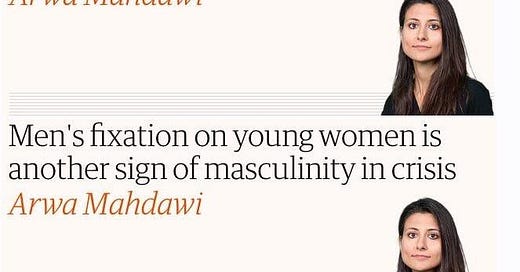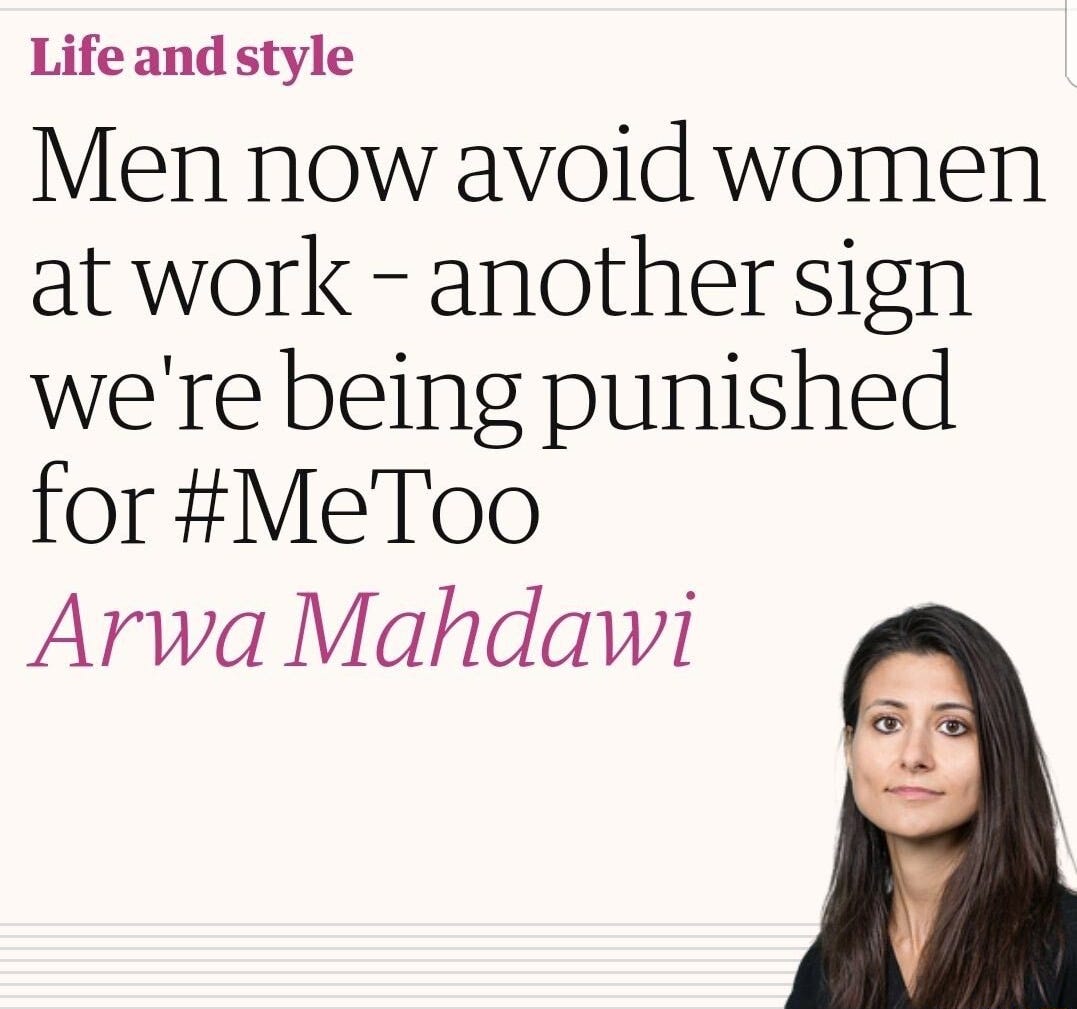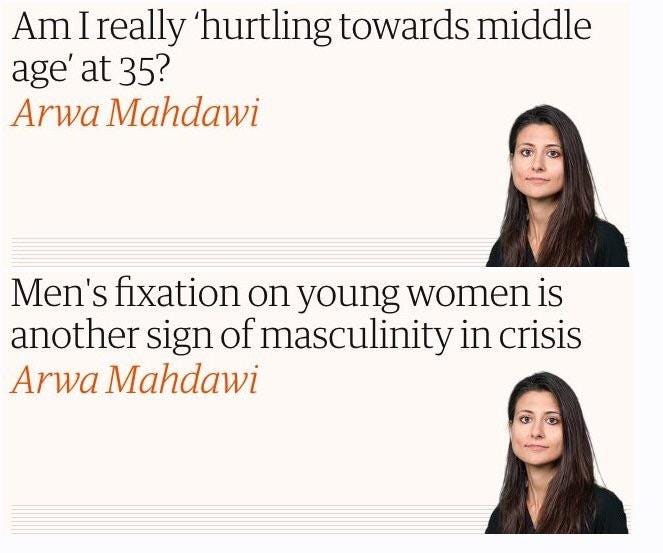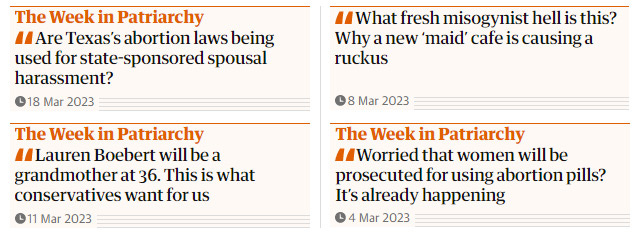This meme was doing the rounds a few years ago. It shows two articles published in 2018 in the Guardian, written by the same woman, less than a month apart.
I assumed it was a joke. For a long time I didn’t even bother investigating because it seemed too absurd to be real. Then one day curiosity took me… and I was amazed to find that the two articles actually do exist.
Now, I am going to take a wild guess about what happened here. But first, I am going to make the wild assumption that something did happen here. This is necessary because a lot of people, today, would pretend to see no necessity for these two articles to be linked in any way, other than the writer and the publication being the same. So let us take the wild, unjustified, irrational, bigoted, misogynistic, fear-based, insecure and hateful step of assuming that there is a link between the two articles, that something did “happen here”. This assumption has not been focus-grouped, scientifically tested, replicated, citation-sourced, or anything. It’s outrageous for me to make it let alone say it out loud. But I am, after all, the vile vlogger.
As to my theory about the link between the articles... It’s probably insane, but hear me out. Mahdawi was worrying about becoming middle-aged, because she knows this is associated with being less attractive to men. Her motive in writing the first article was to convince herself this isn’t a problem. She then spent a few weeks being troubled by this non-existent problem, then came up with a solution to it: blame men for being less attracted to middle-aged women. Her motive in writing the second article was to “convince” herself of this solution to the problem she had previously “convinced” herself was not a problem.
Now, you might think that my theory falls apart because Mahdawi is a lesbian. But no. In fact, the evidence is provided in the headlines themselves. If Mahdawi is not bothered about men finding her attractive after 35 (first article), then why does she blame the phenomenon on “masculinity” (second article)? Clearly, even though she is a lesbian, she does want men to find her attractive. She might not be interested in them, but she is interested in their opinions of her - and not regarding her business acumen, her intelligence, her career, etc. (as one might expect of a feminist) but her sexual desirability. As a woman, she wants men to desire her sexually even though she has no practical use for them desiring her sexually. In other words, it is pure female vanity.
Of course, the solution she proposes (men should be less insecure, then they’d be less “fixated” on young women) is not a solution at all, since insecurity is not the reason men prefer young women. Moreover, it is a stupid attempt at a solution since it holds against men something they cannot change: the fact that youth makes a woman more attractive to them. What’s more, even if men could change this, doing so would be bad for society since it would lead more men to settle with older, less fertile women, which would lower the birthrate. So, at every level, Mahdawi’s request is unreasonable, unrealistic and selfish.
It is also impossible. You are simply not going to persuade men to find middle-aged women equally as attractive as young women. It is just never going to happen. Calling their preference a “fixation” isn’t going to help you, either.
The real solution to the problem is for Mahdawi to settle down with a guy pronto and have children while she still can. It might already be too late - certainly, she would be lucky to manage two babies after 35. Meantime, she should be imploring women younger than her to avoid getting into the predicament she now has to deal with. They can do this by settling down with a guy when they are younger than 35, ideally younger than 25. But of course she doesn’t want that solution because it would violate her feminist principles. So men have to be at fault, which means biology has to be at fault, which means biology has to change so that she doesn’t have to give her readers unwelcome news or face up to the fact that she has made bad life choices. What we are watching here, right out in the open, is a woman deluding herself and attempting to delude others.
Finally, there is yet another aspect to her delusion. She says the root cause of all this, the real problem going on just now in society, is “masculinity in crisis”. Four questions here.
Is it true that men’s “fixation on young women” is a recent thing, ie. something out of the ordinary?
What is the evidence that masculinity is in crisis?
Why is masculinity in crisis?
Why does masculinity being in crisis make men more attracted to younger women?
Mahdawi answers these questions, and thus “justifies” her article’s title, with just this:
While these studies may focus on sexual relations, they’re yet another reminder that we’re facing a crisis of masculinity that is reverberating across every aspect of our society. The far right is dominated by men, many of whom seem to be searching for a sense of identity.
From the article she links to:
Many radical right parties espouse a strongly gendered discourse, in which they appeal to a frail masculinity, threatened by emasculating feminists, effeminate liberals, and overly virile “Others”. While women are mainly presented as victims, particularly of the latter – rape of white women by non-white men is an age-old favorite of the far right – men are called upon to protect their “nation” or “race”.
So to answer the four questions:
Is it true that men’s “fixation on young women” is a recent thing? Of course not. Men have always been very strongly attracted to young women. This has obvious grounding in biology (fertility) but also in personality development (an 18 year-old girl is far more malleable as a life partner than is a 30 year-old woman) as well as high likelihood that she is sexually inexperienced and therefore will be more loyal to you (and therefore that any children she has will indeed be yours), and that she is free of STDs, and that there are no other men’s children already on the scene, etc. There are so many excellent reasons for men to evolutionarily develop a “fixation” for young women, it’s astonishing that it could ever be taken as a socially-induced thing. Most importantly, because this “fixation” is perennial, it cannot be evidence of a contemporary phenomenon (eg. “masculinity in crisis”), since it long predates (and will long outlast) that phenomenon.
What is the evidence that masculinity is in crisis? The far-right being dominated by men and masculinity being a key aspect/concern of far-right politics. Mahdawi links to an article about a Jewish sociologist, Michael Kimmel, whose work confirms this finding and of course pathologises it. But in fact it makes perfect sense that right-wing politics, being of order, hierarchy, tradition and discipline, would appeal more to the male psyche while left-wing politics, being of empathy, sharing and equality, would appeal more to the female psyche. Mahdawi wants a far-left society, but without the far-right responding to it or the problems it creates. One specific example is that she wants diversity, but when diversity leads to white women being raped by non-white men, she doesn’t want “far-right” men to get riled up about their daughters, sisters, girlfriends etc. being raped by foreigners. (Try another planet, darling.)
Why is masculinity in crisis? Mahdawi gives no answer. The answer is feminism, which has fundamentally disenfranchised hordes of men in their own society, but Mahdawi can’t say this without admitting that her worldview has caused fundamental social problems. She wants feminism, but for men to not be disenfranchised by feminism, or at least, if they are, to just meekly accept it. (And if they don’t, her solution is yet more feminism.)
Why does masculinity being in crisis make men more attracted to younger women? Apparently feminism and progressivism have made men insecure, so they want young, silly, naive women who are easily led and/or up for “some fun”. That’s not being insecure, that’s just normality. Men want meaningless and promiscuous sex, so they want women who will give it, preferably with no strings attached and no consequences. Only a traditionalist society will prevent this attitude manifesting. But a traditionalist society is exactly what Mahdawi is viscerally opposed to. She wants traditionalist morals in men, but emphatically not the traditionalist culture that would instill those morals.
Mahdawi wants contradictory things, but lacks the self-reflection to see this and act upon the contradictory, self-defeating and delusional behaviour.
With all of that out of the way, I will get to the real thing I wanted to discuss here. That is the state of a civilisation which has a media industry which publishes two articles like this, by the same writer, less than a month apart. Let us gaze upon the catastrophe once more:
Did Mahdawi’s editor not think, “hold on”?
Let us be clear. As revealed by the first article, the second article directly stems from a hang-up on the part of the writer. Yet we are expected to pretend that it is impartial, disinterested and objective inquiry into a social issue. We can mock Mahdawi for her delusions, but what about the society which expects us to partake in this delusion?
I have often said that, when pontificating about society, or indeed about anything external to oneself, it is absolutely crucial to examine oneself first. As the saying goes:
Know thyself.
One of the symptoms of civilisational decline seems to be that honesty, intellectual rigour and self-reflection gradually go out the window. We are left with an intelligentsia who are incapable of giving good advice or sound reflections on society. Few people are more destructive than intellectuals who have not dealt with the problems within themselves: reconciled the contradictions, resolved the hang-ups, accepted the misfortunes, forgiven the wrongs, overcome the insecurities, etc. You end up with a middle-aged woman who has not made peace with the fact that her beauty was tied to her youth, deluding herself and her readers about unavoidable biological reality.
Such public figures inevitably contradict themselves all over the place. In the age of social media this is quite easy to track. In Mahdawi’s case, one need only scan forward from those 2018 articles to find a cascade of contradictions, inconsistencies and delusions as she struggles to reconcile her worldview with her true needs and wants.
Her employers and peers allow this public maelstrom of self-delusion to go on because they don’t care about Mahdawi’s well-being or dignity, only that she continues to spew the ideologically-correct drivel, and the system will cover for her anyway so it doesn’t matter if anyone notices the contradictions and what it all says about her and what it means for her, to be an embodiment of nonsense ideology. It is better for her peers if these things remain unmentioned, because then they don’t have to examine their own lack of honesty.
In this age, intellectual and social commentary is a terrible concert of denial, deceit and delusion, where the players are flawed people believing fervently in the lies as a desperate refuge from their personal failings, which in turn have gone unaddressed because of the lies of their predecessors. Generation after generation build up an enormous pyre of lies, so that commentators are progressively less moored to reality and more damaged in themselves, even as they attempt to do the job of commentary. So, with each generation, that job becomes ever less about objective analysis, and ever more a form of intellectual triage.
Mahdawi is a sad example of the “standing wave” of this. There is a tragedy to scanning her articles. One gets a sense, not of a bad person, but one who has become attached to lies because they are her only way to “keep believing”. Any honesty would potentially shatter the house of cards, therefore every inquiry is an exercise in avoiding honesty. And the best way to avoid honesty is to avoid ever looking at oneself. There, one is tormented by a thousand invitations towards the truth.
Mahdawi’s work in the Guardian is fixated on the issues of fertility, reproductive rights, and sexism. A year after that couplet of articles about becoming middle-aged and therefore less attractive to men, she wrote:
Are you a woman without kids? Well, listen up please, a Man on the Internet has some questions for you. On Friday, Stefan Molyneux, a far-right media personality and self-appointed expert on reproductive health
She mocks Molyneux as a “self-appointed expert on reproductive health” even though he has never made such a pronouncement, and even though she will, a few years later, confirm what he said about fertility when she describes her own partner’s struggles to conceive.
[Molyneux] tweeted: “Women get mostly infertile at 40, but live to be 80. Without a family, what are you going to do with those 40 long long years?” His tweet quickly went viral as women explained that what they definitely weren’t going to do with those 40 long long years is give a damn about Molyneux’s opinions.
But what he said was not his “opinion”, but fact. Women really will have 40 years of childlessness ahead of them if they don’t have children by 40. That is a fact. You can care about Molyneux’s “opinion” or not, but you will have to contend with the reality he is describing. You cannot both ignore his warning and evade the consequences of doing so. (Seriously, this is Princess Syndrome up the wazoo!)
While Molyneux may be a rightwing troll, his condescending views are by no means unusual.
When you’re delusional but convinced you’re clever, being told the truth is “condescending”.
A fun thing about being a childfree woman in your 30s is that the entire world seems to feel entitled to comment on your reproductive choices and tell you that you’d better get on with things, you’re running out of time!
Again, Mahdawi will confirm all of this a few years after writing these words. Here, she is writing against reality, a reality that she knows and wants to reject, and she does so by casting it as a socio-political delusion. The only delusion is hers.
The idea that a woman’s most important role in life is to bring forth offspring is still deeply engrained in society and there remains a huge amount of stigma and suspicion surrounding childfree women.
More delusion, this time regarding herself. In truth, Mahdawi was not happy being “childfree”, as will soon be revealed. For now, her readers have to entertain her self-delusion.
It’s not particularly controversial for a man to say he doesn’t want children; people can get their heads around that. But women, we’re told, even if we profess to be ambivalent about kids, are biologically wired for motherhood.
As I said, civilisational decline seems to bring with it, not just disregard for the concept of civilisation or the attributes of the particular declining civilisation, but disregard for truth itself. What kind of intelligentsia seriously entertains the notion that women are not “biologically wired for motherhood” or that they are, by default, “ambivalent about kids”? What are the odds of that being true? How much common sense, and how much ancient wisdom, and how much everyday observation, is being ignored in order to pretend that this could ever be true?
Six months after writing these words, Mahdawi and her partner began trying for a child. Nobody could say they were “ambivalent about kids”: conceiving was very onerous and cost them $20,000 yet they persevered, almost as if women “are biologically wired for motherhood”.
This was six months after she had also written these words:
You don’t need to have children to have a happy, fulfilling life. That shouldn’t need to be said in 2019 but the constant pressure to procreate means that, unfortunately, it does. Indeed, there’s evidence that women are actually happier without kids.
Yet, demonstrably, Mahdawi and her girlfriend were not happy without kids. Did she write these words to convince herself about her previous choices, or to reassure herself in case the future attempts to conceive did not work? Either way, was it responsible to rope her readers into a way of thinking that, clearly, was a form of coping? I suspect Mahdawi is not troubled by such questions, because she apparently does not self-reflect.
After a year of trying, her girlfriend became pregnant with “their” first child. I use the inverted commas only because the child has no biological links with Mahdawi, since her womb, eggs and genetics were not involved. (This might have been connected with her being 38 by that time, but then, I have no idea how old her partner was.) In Mahdawi’s words:
The baby may not be genetically mine but, in our hearts and minds, we are equal parents
As for the difficulty and the expense:
You can’t just casually start trying for a child when you’re in a same-sex couple, you’ve got to meticulously plan parenthood. Instead of getting off the pill, you start taking them.
You also start buying sperm. (Look up the price of sperm if you want a shock: it’s more bonkers than bitcoin.) And you start booking doctors’ visits. And getting blood tests. And ultrasounds. And trigger shots. And you go to the hospital and magic medicalised baby-making happens. And then you wait two weeks. And then you get your period and you have to do it all again.
My partner and I spent much of 2020 engaged in variants of the above. Finally, after four IUI (intrauterine insemination) procedures and about $20,000 in bills, she got pregnant. (Hurrah!) ... We may have shelled out a small fortune but, in the end, we were lucky: getting pregnant could have taken a lot longer and cost a lot more.
So, to summarise:
pills
buying sperm
doctors’ visits
blood tests
ultrasound scans
trigger shots
artificial insemination
Or you could have just settled down with a guy at 23 and eliminated all of this difficulty, uncertainty, worry and expense. But that would have meant foregoing the high-flying career in advertising, brand strategy and diversity pimping - the loss to society being incalculable.
It is remarkable to behold Mahdawi’s demands of the world:
Also ridiculous is the amount of judgment that can still be attached to fertility. “Why did you wait so long to start trying?” “Perhaps you should have focused on finding a partner instead of your career.” “Why don’t you ‘just’ adopt?” (There is nothing simple about adopting.) “Are you sure you should be having kids when you’re not married to a man?” Seriously, if I had a penny for every unsolicited opinion I’ve heard about my ovaries, I could buy the world a round of IVF. We need to widen access to fertility treatments, but we also desperately need to widen the conversation around fertility.
So she wants to write endlessly about pregnancy, abortion, IVF, contraception, etc. and to “widen the conversation around fertility” but then, when she finally decides to have a child, doesn’t want any “unsolicited” opinions from other people (and I guarantee what “unsolicited” actually means is “opinions I don’t enjoy”).
Two years after the birth of “her” first child, Mahdawi seems to have written very few articles about parenthood or child-rearing. But in just the last 20 days, she has written the following articles:
This woman is so mired in post-modernity, so screwed up, her thinking so perverted, her worldview so indulgent and delusional, I doubt there is any hope for her. She claimed to be happy being childfree, but demonstrably wasn’t, but waited so long that she will now never have children of her own. Instead, she will help raise the child of a heterosexual couple (her lesbian girlfriend and some male sperm donor), while berating society for not facilitating her dystopian choices more fully than it already does, and enjoining it to facilitate similar dystopian choices in women in general, and even to actively encourage those choices.
For Arwa Mahdawi, if she is messed up, then everyone else should be equally or more messed up as well. And when she pronounces upon these things, nobody should point out the badness of the choices, the badness of the thinking that leads to those choices, the badness of the tendencies that lead to that thinking, or the badness of the culture that celebrates those tendencies.
Truly, Satan is in the room with us.











I’m really appreciating your writing. This is a superb article which very few today would have have the insight and clarity of mind to craft.
"The entire history of life on Earth is wrong because I didn't have the intellectual courage to think for myself 15 years ago"